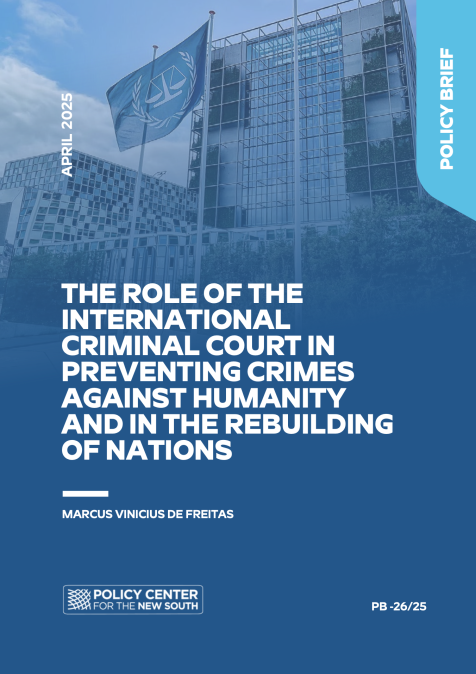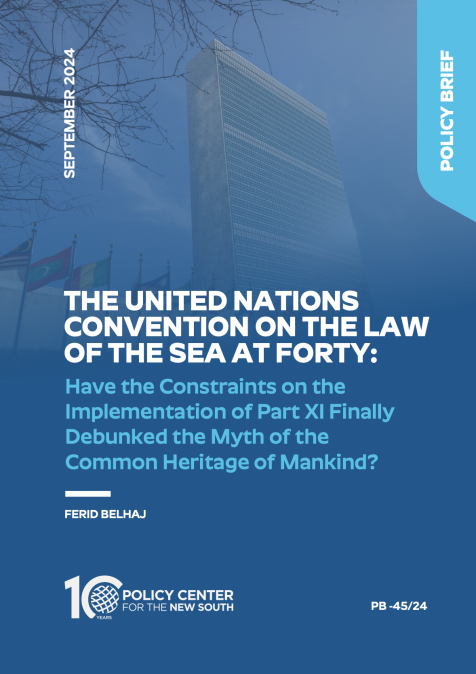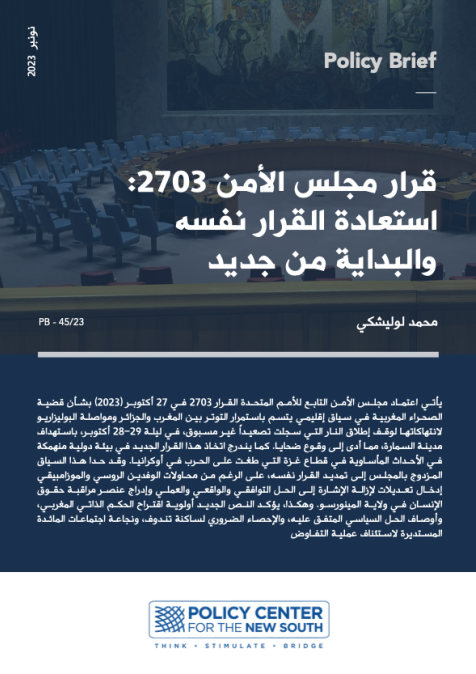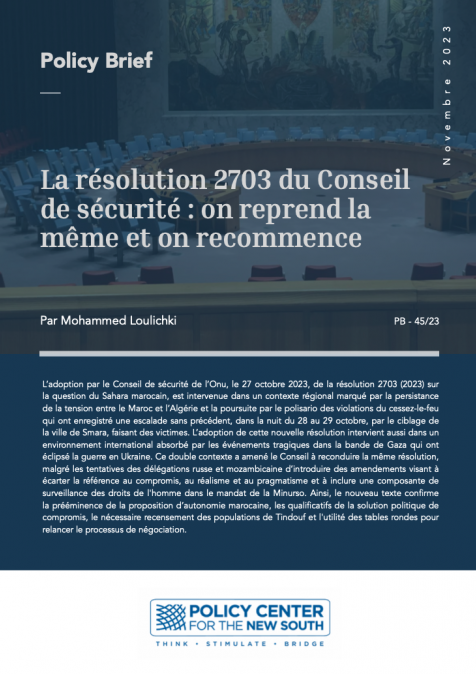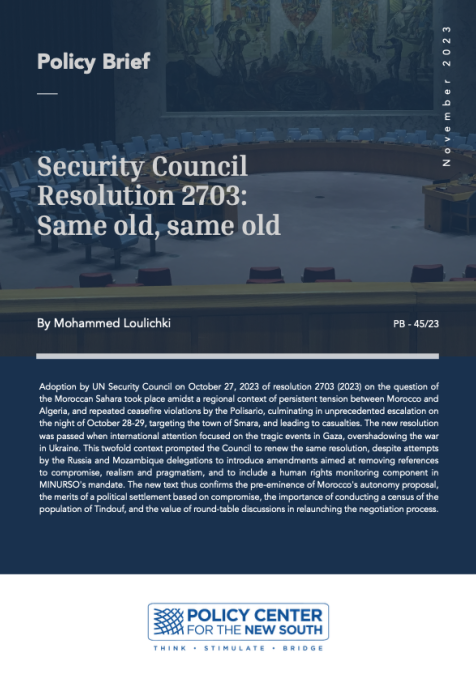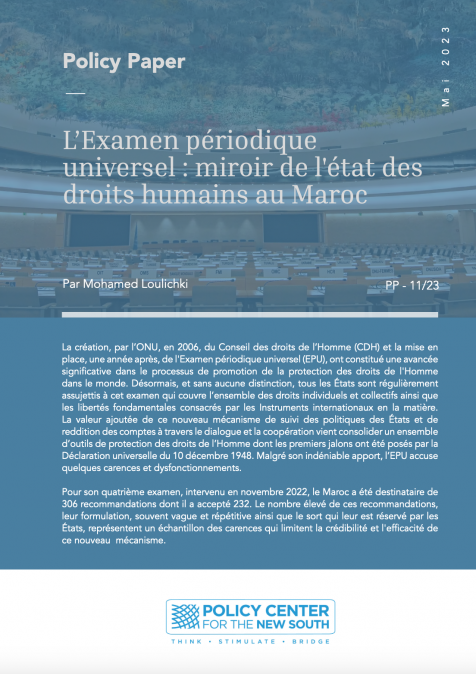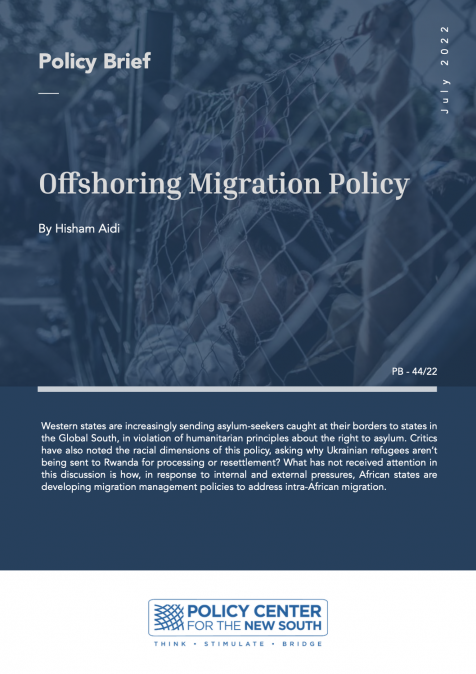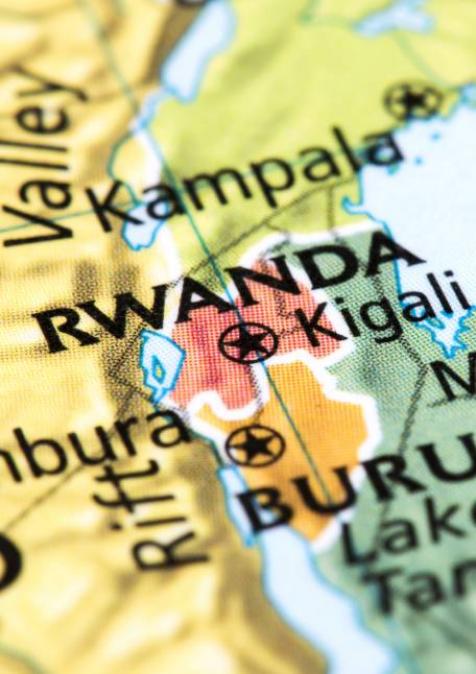Publications /
Policy Brief
This Policy Brief explores the evolving role of the International Criminal Court (ICC) in preventing crimes against humanity and in contributing to post-conflict reconstruction. Established to deter atrocities and ensure accountability for the gravest offences, the ICC is a testament to the international community’s aspiration for a rules-based order. Despite structural limitations — from its dependence on state cooperation to jurisdictional constraints and political backlashes — the ICC has expanded its normative influence, particularly through landmark actions involving high-profile figures such as Vladimir Putin and Benjamin Netanyahu.
The ICC plays a dual role: as a deterrent against mass atrocities by raising the political cost of impunity, and as a moral and legal anchor for societies emerging from conflict. This Brief evaluates the ICC’s limitations in enforcement, its contentious relationship with powerful non-signatory states, and the perception of geopolitical selectivity, particularly in the Global South.
While the ICC may struggle to impose justice upon the powerful, its enduring value lies in setting global expectations, legitimizing accountability mechanisms, and offering victims a voice. As the Court stands at a crossroads, its future will depend not merely on the ideals it represents, but on whether it can deliver meaningful and impartial justice in a fractured world.
Introduction
The atrocities of the twentieth century, including the Holocaust, the genocides in Rwanda and the Balkans, and numerous other instances of mass violence, prompted the international community to address the pressing need for a permanent judicial institution that would hold individuals accountable for crimes that shock the conscience of humanity. Establishing the International Criminal Court (ICC) in 2002 was pivotal in the fight against impunity. The ICC was tasked with prosecuting individuals for the gravest offences, including genocide, war crimes, and crimes against humanity. It also serves as a deterrent against future atrocities and a catalyst for post-conflict reconstruction and national reconciliation.
This Policy Brief explores the ICC’s dual role: first, as a proactive institution that deters potential perpetrators of crimes against humanity through the threat of prosecution, and second, as a facilitator of national recovery, contributing to peacebuilding and the restoration of the rule of law in societies emerging from conflict. Despite significant challenges, the ICC’s continued existence is a testament to its commitment to international norms and the development of a rules-based global order.
The Origin and Mandate of the International Criminal Court
The origins of the ICC can be traced to a historical continuum of efforts to hold individuals accountable for international crimes. The Nuremberg and Tokyo Tribunals set the precedent. Subsequent ad-hoc tribunals, such as the International Criminal Tribunal for the former Yugoslavia (ICTY) and the International Criminal Tribunal for Rwanda (ICTR), laid the practical groundwork for a permanent court. The 1998 Rome Statute, adopted by 120 states, established the ICC with a clear mandate: to investigate and prosecute individuals responsible for genocide, crimes against humanity, war crimes, and, more recently, the crime of aggression. Unlike its ad-hoc predecessors, the ICC was designed as a permanent and universal court. However, its jurisdiction is limited to offences committed within a state party’s territory or by nationals of a state party, unless the United Nations Security Council (UNSC) refers a situation to it.
The Court’s jurisdiction is complementary to national systems, meaning it intervenes only when states are unwilling or unable to prosecute crimes genuinely. This principle of complementarity is a cornerstone of the ICC’s operations, ensuring that it does not supersede national legal systems but supports their pursuit of justice. In other words, the ICC intervenes when national legal systems are unable to effectively prosecute these crimes, thereby filling a crucial gap in the international justice system. The ICC’s mandate is not only judicial but also symbolic, since it serves as a moral compass in the global system, asserting that grave crimes cannot go unpunished. Through its existence, the Court aims to deter potential perpetrators, deliver justice to victims, and contribute to the long-term stability of societies emerging from conflict.
The ICC’s Role in Preventing Crimes Against Humanity
Prevention of crimes against humanity is a crucial aspect of the ICC’s mandate, providing reassurance to the international community. The Court was founded on the assumption that the threat of prosecution would deter atrocities, particularly among state officials and military leaders. While compelling in theory, deterrence remains challenging to measure empirically, and the ICC’s impact on real-time conflict decision-making is often unclear. Beyond direct deterrence, the ICC may contribute to prevention by reinforcing global norms and incentivizing domestic prosecutions. However, its effectiveness is constrained by non-cooperation from significant powers, and perceptions of selectivity. Despite these challenges, the ICC remains a key institution in the long-term project of atrocity prevention.
Though deterrence is challenging to measure empirically, the ICC likely contributes to prevention in three key ways. First, the international scrutiny accompanying ICC investigations raises the political cost of atrocities. Leaders who are aware that their actions could lead to prosecution may act more cautiously, as seen in the indictment of then President of Sudan Omar al-Bashir, which signaled that even heads of state are not immune from prosecution. However, the ICC’s reliance on state cooperation means determined regimes can sometimes evade consequences. Second, the ICC shapes long-term norms of behavior, reinforcing the idea that atrocities such as targeting civilians or using child soldiers are punishable crimes. While the immediate deterrent effect is debated, the Court’s existence helps institutionalize accountability, altering the strategic calculus of future perpetrators.
Third, the ICC empowers domestic institutions and civil society advocates by providing a legal framework and external leverage. In Uganda, the indictment of Lord’s Resistance Army (LRA) leaders including Joseph Kony bolstered local demands for justice, though some argued it initially complicated peace talks. Such cases illustrate how the ICC can strengthen regional accountability efforts. However, its impact depends on the prevailing political dynamics and deterrence has limits. In existential conflicts, the threat of prosecution may not override survival motives. Additionally, ICC interventions can disrupt negotiations. Despite operational challenges, its normative contributions—categorizing atrocities as immoral and illegal—remain pivotal to a rules-based international order.
The ICC’s Contribution to Post-Conflict Recovery
The ICC’s work in post-conflict societies offers a beacon of hope by addressing impunity. While the Court does not directly rebuild institutions, its emphasis on accountability can incentivize domestic legal reforms and empower local justice efforts. For example, by prosecuting atrocities or supporting national trials, the ICC helps legitimize state institutions and restore social trust. However, its impact on reconciliation depends on perceived fairness, and lasting recovery requires broader investments in governance and development. Despite these challenges, the ICC’s symbolic role in affirming justice remains vital to healing divided societies.
For example, while ICC indictments may isolate perpetrators, lasting reconciliation often requires local justice mechanisms. In contexts in which states resist cooperation (e.g. Sudan), the ICC’s role remains more aspirational than transformative. Nevertheless, by affirming universal norms of justice, the Court provides a framework for healing, even if implementation requires broader societal engagement.
The ICC makes significant contributions to post-conflict recovery in several ways. First, its victim-participation scheme allows survivors to share their experiences, fostering recognition, though logistical barriers limit its reach. Second, the Court provides impartial justice when domestic systems are politicized or weak. However, its perceived focus on African defendants and the non-cooperation of powerful states have raised concerns about neutrality. Ultimately, while the ICC offers a vital forum for accountability, lasting recovery depends on linking its work to local reparations and justice efforts.
The ICC’s independent structure enables it to deliver justice that is perceived as more impartial than domestic courts in polarized societies. Through complementarity, the Court incentivizes judicial reforms. However, this approach is most effective when states prioritize international legitimacy, and is less effective when leaders reject ICC authority. Ultimately, while the ICC can catalyze change, sustainable institutional development requires domestic ownership and broader international support.
The ICC’s effectiveness is constrained by its limited enforcement power, reliance on state cooperation, and frequent delays, which can be attributed to procedural complexity or deliberate obstruction. Its interventions risk being seen as foreign impositions, mainly when deployed without local buy-in. However, when aligned with regional priorities or requested by states, the Court gains traction. For sustainable impact, the ICC must calibrate its role to reinforce—not replace—domestic justice efforts, ensuring its work resonates with local norms and political realities.
Challenges Facing the ICC
Despite its ambitious mandate, the ICC’s effectiveness is hampered by jurisdictional gaps and legitimacy deficits. Key powers, including the United States, Russia, and China—citing sovereignty concerns—either did not sign, or withdrew their signatures from, the Rome Statute, thereby limiting the Court’s reach to member states or referrals by the UNSC. Even then, geopolitical vetoes often prevent action against powerful states (e.g. no Syrian referral because of Russian opposition). This selectivity has drawn accusations of neo-colonial bias, mainly from African members. While the ICC can theoretically investigate crimes linked to the territories of its member states, its inability to hold major powers accountable erodes its standing as a truly international institution.
The ICC faces persistent accusations of selective justice, with most of its investigations to date involving African nations, despite serious crimes occurring elsewhere. While it is important to note that many African cases resulted from self-referrals by the states (Uganda, Democratic Republic of Congo, Central African Republic) or UNSC referrals (Darfur, Libya), the geographic concentration has fueled perceptions of bias. This tension peaked in 2017 when the African Union endorsed a collective strategy of non-cooperation, though no mass withdrawal from the Rome Statute ultimately occurred.
The Court’s enforcement limitations compound these challenges. Without its police force, the ICC relies entirely on state cooperation, which often fails when it is politically inconvenient. The case of Sudan’s Omar al-Bashir, who travelled freely through multiple ICC member states (including South Africa in 2015) without arrest for nearly a decade after his indictment, starkly demonstrates this weakness. Such failures undermine the Court’s deterrent capability and perceived legitimacy.
These challenges raise critical questions about the ICC’s capacity to fulfil its mandate. While the principle of universal jurisdiction allows any state to prosecute atrocities such as genocide regardless of location (as demonstrated by Israel’s 1961 trial of Holocaust architect Adolf Eichmann), the ICC’s authority is more limited. It can only investigate crimes committed on the territory of member states by their nationals, or through UNSC referrals, leaving accountability gaps when powerful non-members, such as the U.S., Russia, and China, are involved. This jurisdictional constraint, combined with the Court's reliance on state cooperation for enforcement, fundamentally shapes its effectiveness.
Eichmann’s prosecution marked a watershed for universal jurisdiction, demonstrating that perpetrators of atrocities could face accountability across borders even decades later. While Israel invoked both the protective principle (given Eichmann’s targeting of Jews) and emerging norms, the case did not fully resolve sovereignty disputes, as seen in later International Court of Justice rulings. Its true legacy lies in cementing core principles: the imprescriptible nature of international crimes, individual liability regardless of rank, and the transnational reach of justice. Today, universal jurisdiction remains vital for filling ICC gaps, as national courts continue to prosecute atrocities that the ICC cannot address.
The Eichmann precedent, while groundbreaking, highlighted the inherent tension between legal principles and geopolitical realities—a challenge that persists to this day. The ICC now operates in an increasingly complex landscape, in which universal norms often conflict with state sovereignty and the dynamics of power politics.
This underscores a paradox: while Eichmann’s trial demonstrated that individuals can be held accountable across borders, the ICC’s ability to replicate this success is often constrained by twenty-first-century realpolitik. Powerful states now simultaneously invoke international law against adversaries while shielding themselves from its reach, leaving the Court's universalist aspirations usually unrealized.
This tension suggests the ICC’s effectiveness may depend less on legal precedents such as Eichmann, and more on building political coalitions to enforce its rulings, as seen when NATO allies supported the arrest of Serbian officials for the ICTY in the 1990s.
The ICC, Vladimir Putin, and Benjamin Netanyahu: A Turning Point for International Justice?
The ICC’s arrest warrant for Russian President Vladimir Putin (2023) and investigation of Israeli Prime Minister Benjamin Netanyahu (2024) represent defining moments in international justice, pushing the boundaries of legal accountability into uncharted geopolitical terrain. By targeting sitting leaders of nuclear-armed states and their allies, the Court has challenged two sacred tenets of the world order: sovereign immunity and great-power impunity. While the Court’s actions affirm that no individual is above international law, they expose its fragility. Without enforcement mechanisms or UNSCsupport, the warrants function more as moral indictments than practical instruments of justice. The resulting backlash—from Russia’s retaliatory warrants against ICC judges to the U.S.’s threats to sanction the Court—reveals the paradox of twenty-first-century accountability: the ICC can now name the world’s most powerful offenders but cannot compel them to face trial. These cases may ultimately be remembered less for their legal outcomes than for their symbolic rupture of the Westphalian status quo, demonstrating that norms evolve more rapidly than the structures designed to enforce them.
On March 17, 2023, the ICC made history by issuing an arrest warrant for Vladimir Putin, alleging his criminal responsibility for the unlawful deportation and transfer of Ukrainian children from occupied territories to Russia—a war crime under Article 8(2)(a)(vii) of the Rome Statute. This landmark decision represented the first time the Court had charged a sitting head of state from one of the five permanent UNSC members, directly challenging the doctrine of great-power impunity that had long constrained international justice.
The Kremlin's response was immediate and uncompromising: Moscow declared the warrant "legally void," initiated criminal proceedings against ICC Prosecutor Karim Khan and several judges, and formally withdrew its signature from the Rome Statute, although Russia had never ratified it. State media intensified rhetoric framing the ICC as a ‘political weapon’ of Western neocolonialism. Putin defiantly travelled to several ICC member states without arrest attempts, exposing the Court’s enforcement limitations.
While Moscow dismissed the warrant as illegitimate, the indictment broke new normative ground by rejecting Russia’s claimed immunity. This precedent took on added significance in May 2024 when Prosecutor Karim Khan sought warrants for Israeli Prime Minister Benjamin Netanyahu and Defense Minister Yoav Gallant, alleging war crimes, including “starvation as a method of warfare” and intentional attacks on civilians, alongside warrants for three Hamas leaders for the October 7, 2023, atrocities.
Israel and its U.S. allies mounted a fierce diplomatic campaign against the Court, including congressional threats to sanction ICC officials. The Israel and Russia cases demonstrate the ICC’s newfound willingness to confront powerful states and the sobering reality that such actions entail. At the same time, legally unprecedented actions often yield more symbolic than practical consequences when targeting leaders protected by geopolitical alliances or veto power.
The ICC’s scrutiny of Netanyahu triggered a vehement backlash from Israel and its allies, particularly the U.S. President Biden denounced the investigation as “outrageous”, while bipartisan U.S. lawmakers threatened sanctions against ICC officials—echoing similar moves against the Court during its Afghanistan investigation. Israeli officials framed the probe as antisemitic bias, arguing it unfairly equated democratic self-defense with Hamas’s terrorism.
Critics globally accused the ICC of double standards, noting its sluggish pace on cases involving Russia, China, or Saudi Arabia. However, proponents highlighted the legal rigor behind the warrants. With over 35,000 Palestinians reported killed in Gaza—primarily women and children—many human rights groups saw the ICC’s intervention as a belated but necessary check on impunity, regardless of a state’s political system.
The Putin and Netanyahu cases epitomize the ICC’s fundamental dilemma: upholding legal principles in a world where power often trumps justice. While these indictments are unlikely to result in arrests, given Russia’s and Israel’s non-cooperation and the Court’s inability to compel action against sovereign states, their symbolic impact is profound. By formally charging the leader of a UNSC permanent member and a Western-allied prime minister, the ICC reaffirmed the fundamental principle that accountability has no exceptions, regardless of rank or nationality. It has also exposed the structural weaknesses of international justice when confronting states with veto power and superpower patronage. Additionally, it has revealed how political weaponization cuts both ways—while critics accuse the ICC of bias, powerful states actively undermine its legitimacy to protect their interests. These cases have tested the ICC’s authority and stress-tested the entire premise of a rules-based international order.
The polarized reactions to these cases revealed a fundamental crisis in the ICC’s global legitimacy. While the Court’s early focus on African cases fueled perceptions of neocolonial bias, its recent targeting of influential Western-aligned and Russian leaders has ironically drawn criticism from all sides, exposing the hypocrisies of an international system that champions accountability only when geopolitically convenient. For the Global South, unenforced warrants against figures such as Putin or Netanyahu risk confirming that international justice remains selectively applied, despite its universal pretensions. Meanwhile, Western states that once celebrated ICC prosecutions of African warlords now reject its authority over their allies. This moment tests whether the ICC can transcend its enforcement paralysis by securing tangible consequences through travel bans or asset freezes, while demonstrating true even-handedness through investigations into abuses by all major powers.
More profoundly, these cases have stripped bare the central contradiction of international justice. Without mechanisms to hold the powerful accountable, the system operates as a tool of moral rhetoric rather than actual law. The Putin and Netanyahu warrants may prove significant not for their legal outcomes, but for revealing this uncomfortable truth in undeniable terms.
The ICC and the Future of International Justice
As the ICC navigates the tensions between legal ideals and power politics, its role in shaping accountability norms remains vital, but its long-term relevance hinges on strategic adaptation. One avenue would be to deepen institutional partnerships, including collaboration with the African Union to address criticisms of bias, coordination with the European Union on witness protection and asset freezes, and leveraging human rights NGOs for grassroots evidence-gathering. These alliances could help bridge the Court’s enforcement gaps, while rebuilding trust with skeptical nations in the Global South. However, such cooperation requires a delicate balance to be maintained—regional bodies often prioritize political stability over justice, as seen in the AU’s past reluctance to enforce ICC warrants. The Court’s future may depend on its ability to function less as a standalone tribunal and more as a hub for global accountability networks.
To dispel enduring charges of selective justice, the ICC must credibly investigate atrocities committed across the geopolitical spectrum, including by militarily dominant states and their proxies. While the Court has tentatively broadened its focus beyond Africa with probes into Georgia and Afghanistan, these efforts have been hamstrung by political obstruction and inconsistent follow-through. The shelving of the Afghanistan investigation under U.S. pressure in 2020, followed by its hesitant revival, epitomizes this struggle. Actual impartiality would demand not only high-profile warrants, like those for Putin or Netanyahu, but sustained attention to under-pursued crises—from Yemen’s civilian bombings to Myanmar’s systemic persecution of the Rohingya. Achieving this requires confronting complex realities: the Court’s annual budget of around €185 million pales in comparison to the legal resources of single superpowers. At the same time, its reliance on state cooperation renders it vulnerable to geopolitical blackmail. Until the ICC can secure independent funding streams and forge enforceable alliances with regional bodies, its universal mandate will remain aspirational rather than operational,reflecting global power asymmetries rather than being than a tool to correct them.
Another critical area for improvement is the ICC’s enforcement mechanisms. The Court’s reliance on state cooperation has proven to be a significant weakness, particularly in cases involving high-profile individuals. To address this, the ICC could explore alternative enforcement strategies, such as collaborating with Interpol or utilizing international sanctions to encourage states to comply.
Additionally, the Court could advocate for the establishment of a global police force or other enforcement mechanisms to ensure arrest warrants are executed promptly. Finally, the ICC must continue to prioritize victim participation and reparations. The Court’s victim-participation scheme has been a positive step toward ensuring that those affected by atrocities have a voice in the justice system. However, more must be done to provide meaningful reparations and to support victims, particularly in post-conflict societies where resources are scarce.
By prioritizing victims’ needs—through participation, reparations, and recognition—the ICC reinforces its role as a court of justice and as a beacon of hope for those who have suffered the most. Nevertheless, this promise remains incomplete without tangible outcomes: arrests are delayed by geopolitical resistance, funding gaps hamper reparations, and justice is often symbolic in the face of impunity.
The ICC represents a bold experiment in enforcing international justice, and its mission—to prevent atrocities, punish perpetrators, and rebuild shattered societies—reflects the highest ideals of the global community. However, its legacy will ultimately depend on whether states translate these ideals into action, overcoming the enforcement gaps and political divides that currently limit its impact. The ICC’s strength lies in its vision; its future hinges on the world’s willingness to uphold it. Despite significant challenges, the Court has made meaningful contributions to global accountability and the promotion of a rules-based international order. Although difficult to quantify, the ICC’s symbolic power and normative influence underscore its role in deterring crimes against humanity. Through its actions, the Court has set expectations for acceptable conduct during times of war and political crisis. Its contributions to post-conflict reconstruction, particularly in victim participation, institutional reform, and legal capacity-building, demonstrate its potential as a partner in peacebuilding.
However, the ICC’s effectiveness depends on the political will of states, the strength of national legal systems, and the support of international and regional organizations. For the Court to realize its full potential, it must address its shortcomings transparently and adapt to an evolving geopolitical landscape. Pursuing international justice is a long-term endeavor, and the ICC remains a critical, albeit imperfect, instrument in this journey.
Expanding Jurisprudence: The ICC’s Role in Climate-Linked Atrocities
The ICC was never intended to operate in isolation. The principle of complementarity assumes that domestic jurisdictions will eventually shoulder the burden of justice. However, in regions where state capacity is entrenched, interests shield weak or politically connected elites. Regional legal mechanisms may offer a practical and culturally resonant intermediary.
Africa’s proposed African Court of Justice and Human Rights (ACJHR)—once operational—and Latin America’s Inter-American Commission on Human Rights (IACHR) demonstrate the potential of regional systems to fill accountability gaps. However, their effectiveness varies: the IACHR has a more substantial record of rulings, though compliance remains inconsistent, while establishment of the ACJHR has been delayed, raising questions about political will.
By deepening collaboration with such institutions—not just through information sharing, but also via co-prosecution models or delegated jurisdiction—the ICC could enhance its legitimacy and improve enforcement. Such partnerships could also help localize justice processes, countering perceptions of the ICC as an external or neocolonial actor. However, success depends on whether regional bodies can resist political interference and operate independently of it. Without this, even hybrid approaches may struggle to overcome the structural limitations of international justice.
To this end, the Court should expand its investment in technical cooperation programs, judicial training, and legal harmonization efforts, leveraging partnerships with regional bodies and NGOs to maximize impact. Building this ‘scaffolding’ of regional justice would enhance prosecutorial efficiency, allowing the ICC to focus on the most systemic crimes while fostering a more robust, globally consistent legal culture. However, success depends on aligning such efforts with local priorities and securing sustainable funding, as top-down impositions risk reinforcing resistance to international justice mechanisms.
Normative Impact and the ICC’s Soft Power
Beyond convictions, the ICC’s greatest strength lies in its normative influence. By setting new accountability thresholds and exposing systemic violations, the Court has reshaped human rights diplomacy and altered the behavior of states and armed groups. Its soft power operates through signals: arrest warrants, suspect naming, and preliminary examinations serve as deterrents or leverage. For instance, ICC pressure prompted Kenya, Côte d'Ivoire, and the DRC to initiate legal reforms or truth commissions, though long-term justice remains inconsistent. However, the Court’s impact is contingent on geopolitical backing; without enforcement cooperation, its signals risk being symboliconly. Ultimately, the ICC’s legacy may be more significant in its efforts to embed atrocity accountability as a non-negotiable global norm than in the trials themselves.
The ICC’s soft power remains contingent rather than absolute — a currency depreciating when procedural credibility wavers. To sustain its normative authority, the ICC must institutionalize evidentiary reforms while adopting the victim-centered approaches pioneered by hybrid tribunals. Geopolitical pressures further complicate this balancing act. Without consistent adherence to its standards, the Court risks diminishing its influence through symbolic gestures, as critics allege, as seen in the 2023 Putin warrant, which generated headlines but yielded no tangible accountability.
Conclusion
The ICC stands at a crossroads. To retain its relevance in an increasingly skeptical world, it must rebuild trust with the Global South by moving beyond symbolic engagement with bodies such as the African Union, to genuine power-sharing in investigations and prosecutions. Additionally, it must develop practical enforcement mechanisms to transform arrest warrants from paper judgments into meaningful accountability. Moreover, finally, it must prioritize its restorative justice mandate by dramatically increasing victim reparations.
While the Court has undoubtedly transformed international norms, as evident in its historic warrants against Putin and Netanyahu, these actions expose its central paradox: the ICC is most assertive where it is least enforceable. In a multipolar world in whichgreat powers openly flout international law and regional blocs pursue competing justice models, the ICC must evolve from a Western-dominated institution into a truly global forum. Its future will depend not on lofty ideals alone but on its ability to deliver tangible justice where it matters most—for victims in courtrooms and their shattered communities.
Bibliography
Arendt, Hannah. Eichmann in Jerusalem: A Report on the Banality of Evil, Penguin Books, 1963.
Burke-White, William W. "Complementarity in Practice: The ICC as Part of a System of Multilevel Global Governance." Leiden JIL, 2005.
Du Plessis, Max. The International Criminal Court and Africa: A Fractured Relationship? Institute for Security Studies, 2017.
ICC Press Release, 'ICC issues arrest warrant for Vladimir Putin,' March 17, 2023.
Sikkink, Kathryn. The Justice Cascade: How Human Rights Prosecutions Are Changing World Politics, W. W. Norton, 2011.

